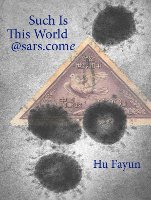Such Is This World@sars.come
A shy and elegant widow finds her voice in writing for the Internet, and a powerful official seeks her hand. When she learns of a terrifying new disease, she watches online warnings of the plague get eerily deleted before her eyes. Through the Internet she meets a small band of freethinkers, comes to view history in a new light, and finds that truth has a price.
Hu writes finely-honed novels that deal with big issues in complex, nuanced ways. His most popular work is Ruyan@sars.come, a novel written in 2004 about the Severe Acute Respiratory Syndrome epidemic that swept through China. (This is also his only work to be translated into English . . . .) The novel centers on an upstanding woman named Ruyan— a person whose honesty and forthrightness immediately captured the public’s imagination.
Hu Fayun has written the book I’ve dreamed of: historical fiction that truly captures what China was like during the time of SARS, and that in doing so opens a panoramic historiographical window on modern China... But SARS is really a small part of this book. The book is about freedom, about artistic liberty, about integrity, and about how even the most ardent of reformers can be bought and paid for by a government dangling goodies and perqs... This is a great novel and an unequaled look into contemporary China and how/why it is what it is today. It has everything — suspense, intrigue, history, pathos, romance, sex (briefly), philosophy and politics. A great novel with a great translation.
As a story of sensitive, cultured people trapped in political barbarism, Such Is This World bears comparison with the best of the Soviet-era dissident novels.
Author, Fire From the Sun
To define this novel by its political aspects alone would be simplistic. It is, I think, one of those great works of art in which there are villainous acts but no true villains, in which every character is if not likable then at least human.
Director, Living with Dead Hearts
A daring analysis of what is wrong with China today.
Author Hu moves his tale briskly and delights the reader with literary and cultural allusions. I particularly enjoyed the philosophic look at the beauty of perfect handiwork by a peasant and Teacher Wei’s comparison of a third wife to the third infusion of water into the teapot, so praised by connoisseurs.
A haunting account of internet activism during the SARS outbreak, Hu Fayun’s Such Is This World is a masterpiece among dissident novels. For the curious, the comprehensive endnotes to this edition offer crucial explanations and convey the intricacies of China's cultural politics. I've been studying and writing about Chinese literature since 1985, and I have never learned so much so quickly. Even a long-time Sinologist will profit from the translator’s notes, which will spare students new to the field countless hours of searches to learn key material.
Professor of Chinese and Comparative Literature, Smith College
Fellow, Public Intellectuals Program, National Committee on U.S.-China Relations
Author, Chinese Literature: A Very Short Introduction
and The Heart of Time: Moral Agency in Twentieth-Century Chinese Fiction
There is a great deal of variety here, and if the storylines aren’t entirely compelling it is nevertheless a perfectly fine novel of its times, presenting an interesting picture of near-contemporary China.
The novel itself feels like a mysterious and powerful e-mail that hits and opens up more and more hearts.
What makes this novel enjoyable is the realism with which events and characters are depicted. Drawing us into the China of today, it sets scenes and characters before the reader and allows discussions and debates to unfold like a live broadcast. Over there, the Internet has become the front line of a clash in which the government strives to maintain its control not only by shutting some sites down, but by joining the conversation among the ‘netizens.’ The book’s ample appendix of notes is quite valuable for those who wish to delve deeper.
President, Biblioteca Archivio Piero Calamandrei, Comune di Montepulciano

